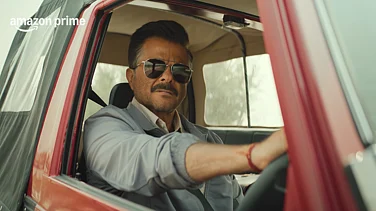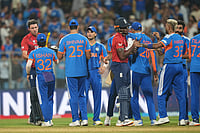
Summary of this article
The Smashing Machine marks Benny Safdie's first solo directorial outing post the split with his brother, Josh.
Dwayne Johnson stars in a soft, low-key portrait of real-life MMA fighter, Mark Kerr.
The film steps aside from the usual trappings of sports biopics to examine living with failure.
To encounter Dwayne Johnson in Benny Safdie’s The Smashing Machine is to meet an artist stripped of all vanities and affectations, profoundly humbled. The film, which bagged Safdie a Silver Lion Best Director at this year’s Venice Film Festival, takes a surprising, antithetical approach to the standard-template sports biopic. In a keenly intimate portrait of real-life MMA fighter, Mark Kerr (Dwayne Johnson), Safdie is determined to prickle audience expectations, at least until the final act, which chooses a disappointingly commonplace wrap-up. Yet, there are sobering moments throughout, mostly embodied in an achingly transparent Johnson. He feels human and fragile, a delicate miracle beneath the outsized body.
There's the enormous physical strength undercut with deep emotional reserves, a vulnerability afraid of itself. He essays a man who quite frankly confesses he wouldn't know what to do, how to respond if he ever loses. The prospect of a defeat is otherworldly to Kerr. It's beyond his wildest imagination. Kerr throws him so deep into the matrix of winning functional life retreats, the rest of reality has to be in constant liege to the exultation of triumph. Drawing from events between 1997 and 2000, The Smashing Machine is certain in its key resistance. Even as you may be lured by the advent of thrilling markers in a wrestler’s journey, Safdie is more eager to peek through cracks in the myth of so-called strongmen. The opening infused with archival footage folds seamlessly into Johnson advancing to the ring, getting all the dopamine from the cheers. In an interview, Kerr professes feeling like God once he’s through a set of matches. At the particular point in his career where the film opens, he’s been on a spotless winning streak.

So, when loss does strike, he's totally untethered, cast off the deep end. His spirit, his comprehension are snipped. Safdie treats the crushing, disorienting blow of these moments respectfully, patiently. The effect is that of a whole system that drives Kerr's being off the rails. Maceo Bishop's camera trails Kerr as he moves away from the flashy lights, the fanfare into the abscesses of the building until he breaks down. Johnson is fantastic in the knock-on delirium, the harrowing instability of being rejected by the sport defining him. Kerr clings to a private desolation, pushing off his girlfriend, Dawn’s (Emily Blunt) empathy. The way he sees it, their relationship can only exist when she's not stepping too close into his professional life. As much as she seeks to be included, to be given a sense of his wrestling high, he tightens boundaries.
Kerr can thrive as long as he is in charge of his emotions, with a laser focus onto his next win. Without that, his self and identity fracture apart into nothingness. He can barely recognise himself so lost and spiralling. Dawn emboldens him, nudges him to stay upbeat. But the minute she tells him to get over being mopey because of one lost match, he loses it. Ramming down a door in fury, he never inflicts violence on her. But the creased nerves, the emotional disruption hang in the air. Even when they are pleasant and agreeable and having a wonderful time, you sense things poised to go south very soon. Kerr and Dawn aren’t healthy for each other; his best buddy and longtime coach, Mark Coleman (Ryan Bader) sees the damage, toxicity spilling through the on-off-on relationship. While Kerr seems to operate best in disconnected solitude, Coleman is his complete opposite, a true-blue family man. Bader is terrific in the minimal Safdie gives him. As he slips back into his contestant roots, one final bid to do something fulfilling that’s also essential for raising his family, Bader quietly sneaks up on you.

Trust Blunt to give precise, searing dimension to the intense volatility being around Kerr results. It’s an unyielding negotiation with Kerr’s force field where childlike lovableness juts into the most alienating lows. It’s in the sparring, hot-cold dynamics between Kerr and Dawn where The Smashing Machine achieves a visceral kick. Whenever Blunt walks in, the film gets back its fervid, heated pulse. There are micro-moments attesting to her easy, spare impact. A single tear Blunt swats away when Kerr blithely asks her to take a photograph of him and his rivals, after being terrible to her, cuts deep.
Safdie’s drama is rife in contradictions. Every element that seems to land shares space with an occasional skirting of blandness. For all of Kerr’s hulking physique, he’s soft-voiced, a mildness that attracts quick friendliness and reliability. But he’s also given to addiction. Dawn sticks with him through thick and thin, but all that Kerr wants at times is simple and absolute dissociation. Safdie doesn’t shy from the selfishness of both. After Kerr is out of rehab, Dawn confesses missing taking care of him. Yet she’s also callous and too blissfully unaware, at least to him. Her neediness chafes at him, he winces. But there are moments when Kerr’s casual cruelty and indifference to her overwhelms. Why does she keep coming back to him? Blunt expands gaps in the screenplay by hinting at Dawn’s accumulated wounds precipitating her constant reverting to Kerr.

The Smashing Machine works its compelling hold when it focuses on all the dissonances within Kerr. At times, you wonder if it could have drifted out into the macro. After all, Safdie does stir consternation for the gory sport. But the emphasis stays steered to the tenuousness throbbing underneath the spectacular aggression. The Smashing Machine locates this bleeding heart with bracing, poignant depth. What does it mean to fail, cede ground gracefully after a life of unmitigated, singular zeroing in on triumph? Safdie's plumbing raw, unvarnished humanity blots out the irregular indecision.
























